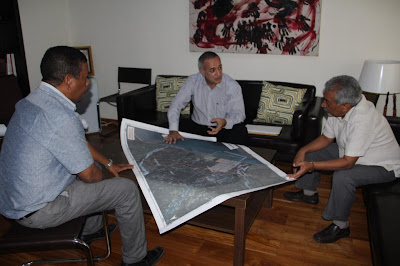The treaty called Certain Maritime Arrangements in the Timor Sea or CMATS splits revenue from Greater Sunrise 50-50 and restricts negotiations on a permanent maritime boundary.
But East Timor has initiated arbitration and is seeking to have the treaty declared invalid, saying Australia did not negotiate in good faith.
The Australian Government has rejected the premise of the action, saying the treaty is valid.
Seven years on from the treaty signing the Greater Sunrise field remains untapped because the operator Woodside wants to process the gas on a floating platform.
But East Timor wants it piped to its south coast for onshore processing.
Reporter: Sara Everingham
Speakers: Alfredo Pires, East Timor's Natural Resources Minister
PIRES: On the 23rd. April, this year, the government of Timor Leste formally issued an arbitration to the government of Australia regarding the CMATS agreement.
EVERINGHAM: Why does your government say that this treaty is invalid?
PIRES: Specifically, we are raising the issue that during the process of negotiations, there were some exercises of covert operations that allowed the other side to have information which assisted the inquisition itself during the process of negotiations.
EVERINGHAM: The Australian government says that these allegations are not new. Does your government have any new evidence?
PIRES: What I can at this stage, we are now in a legal process. Timor Leste has made an allegation and through the legal process and in due course, we have to back up those allegations. We've made those allegations and we are prepared to back up those allegations according to the legal procedures that has been established in international forums.
EVERINGHAM: East Timor now has the option of cancelling the treaty. Why not just do that?
PIRES: Legal opinion states that in doing that, we run the risk of also terminating the international (word indistinct) agreement and also terminating the Timor Sea treaty and possibly running into the regulating bodies existence as well, so that's quite a bit tricky. The better option is to invalidate CMATS and go on about discussions, how we move onto the future, so that is the preliminary analysis of the legal situation.
EVERINGHAM: What is it about the treaty that East Timor's not happy with?
PIRES: Well, it's not the treaty, it's CMATS itself does state quite clearly there that it's not enough to solve the issues that we have and we can terminate. But the treaties itself there are some clauses which says that even if we terminate CMATS itself , according to the rules of CMATS, we can come up and discuss and come up with an agreement, but at anytime in the future, should production start in Greater Sunrise, we go back again to the original CMATS. So those kind of clauses come together, it's quite messy and it will not provide certainty that big money needs for that. So we want something more certainty, longer certainty in the Timor Sea for us to be able to do business in the long term.
EVERINGHAM: Is this a negotiating tactic to get Australia and Woodside to reconsider building the pipeline to East Timor?
PIRES: No, there are still important issues in this as well. There's an issue about relationships between the two countries, about Timor Leste seeking a proper relationship, an honest relationship something where two countries can look at eye-to-eye and we don't need to resort to these other illicit activities and that's one. And the other part is we need a much permanent certainty to provide for the private sector to be able to operate in that area and we are after more equitable outcome in these arrangements.
EVERINGHAM: How does invalidating a treaty provide more certainty?
PIRES: Well, by having that treaty, now we've got all this confusion at the moment, so companies are a bit concerned, but by sitting down and looking at it and coming up with something that's a much more robust without those confusing articles. We maybe able to come up with something much more certain.
EVERINGHAM: Is there a risk though, that invalidating the treaty could scare off investors?
PIRES: Yes, we don't shy away, that there are risk elements there, but in the oil and gas industries, countries, companies oil and gas is a different animal. People analyse the risk elements. I'm sure all companies involved in the Timor Sea joint petroleum area have very capable legal people. They've analysed all the consequences and so forth. But at the end of the day, when you have a field that is big and it's world class, the bees always come to the honey.
EVERINGHAM: Are you concerned this will affect the overall relationship with Australia?
PIRES: No, no. The relationship between Timor Leste and Australia is a very mature relationship. In mature relationships, you can enjoy the benefit of having differences and finding ways to work this out. For Timor Leste, we don't mix this particular issue with our relationship. We've had other relationship with other neighbours, which was much more bitter, but we are now very good friends, we've reconciled, we have other issues, but we go through the process and it's solved. You try to fix it and move on.
















